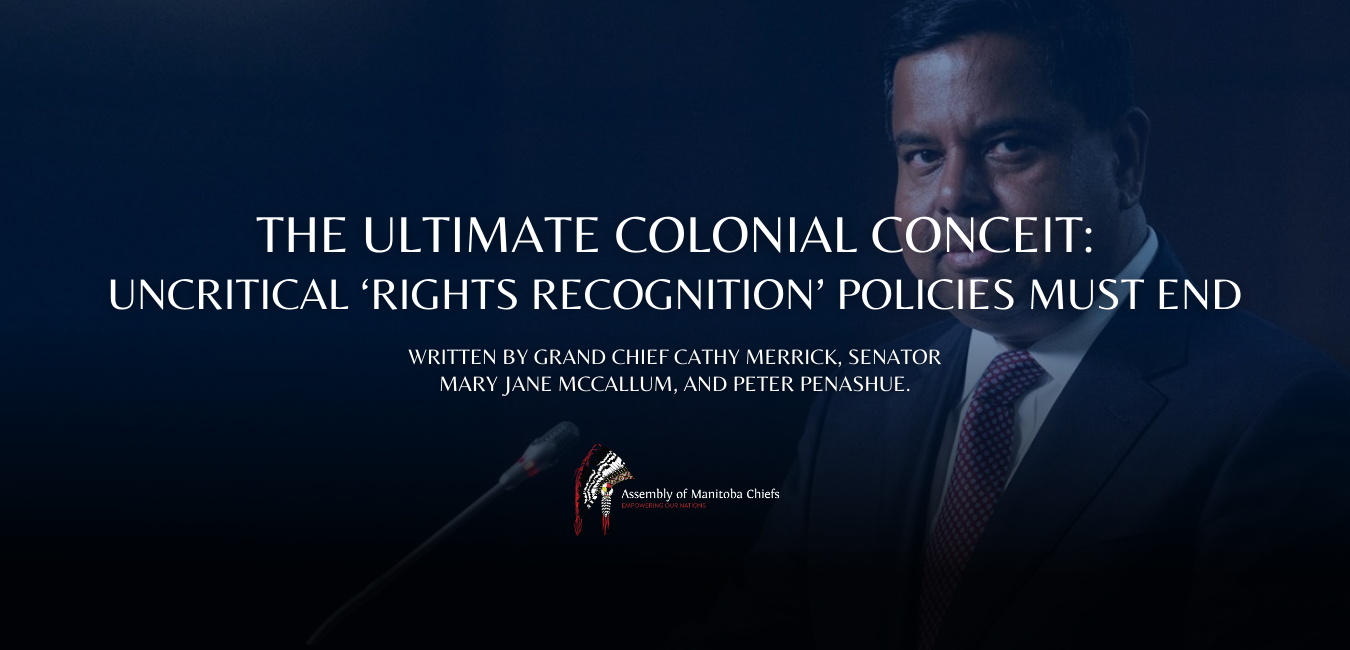THE ULTIMATE COLONIAL CONCEIT:The Government of Canada must put an end to the policies embodied by bills C-53 and S-14.

January 3, 2024
Treaty One Territory, Manitoba
AMC Communications
Written by Grand Chief Cathy Merrick, Senator Mary Jane McCallum, and Peter Penashue.
Published in the Hill Times.
First Nations hold inherent, treaty, and Sec. 35-recognized rights which pre-exist the Government of Canada and Confederation. The United Nations Declaration on the Rights of Indigenous Peoples recognizes that our inherent rights derive from our political, economic, and social structures, and from our cultures, spiritual traditions, histories, and philosophies, especially as these rights relate to our lands, territories, and resources.
Our inherent rights, which have existed since well before Europeans arrived on our shores (in other words, since time immemorial), are now once again under threat. Settlers and their descendants are now claiming to be Indigenous to fraudulently gain access to our territories, lands, and resources.
Until recently, such “self-Indigenized” groups often received little attention and gained little traction as there was little or no benefit to claiming to be Indigenous. Before there was money in identifying as Indigenous, many of the people who now claim this heritage had identified as settlers, and looked down on those of us who have always been who we are.
This has changed. There are now large and well-funded groups who rely on the size of their memberships and the current federal policy of “rights recognition” to claim rights to lands and resources with little or no historical evidence, and to demand benefits through programs and services intended for legitimate First Nations, Inuit, and Métis peoples who continue to struggle with the real consequences of dispossession and denial.
In doing so, these self-Indigenized groups are stepping on and over our people. The lands, rights and ways of life of First Nations, Inuit, and Métis peoples are being appropriated by groups, organizations, and individuals making false or largely fictitious claims. But what is most shocking is that such claims are being given legitimacy by well-meaning officials and Parliamentarians, and the burden is being shifted from the self-Indigenized group to the actual rights-holders to demonstrate that these “pretendians” are not who they say they are.
An urgent policy correction is required. The Government of Canada is presently advancing draft legislation through Parliament and the Senate which would give statutory recognition to illegitimate rights assertions from groups who lack the authority to represent rights holders. Both Bill C-53, An Act respecting the Recognition of Certain Métis Governments in Alberta, Ontario, and Saskatchewan; and Bill S-14, An Act to amend the Canada National Parks Act, demonstrate a studied lack of attention by the government to the consequences of recognizing self-Indigenized groups, and a complete failure to properly consult with the organizations representing legitimate Sec. 35 rights holders in the development of the legislation.
Bill C-53 provides broad constitutional recognition to an unidentified number of present and future communities represented by the Métis Nation of Ontario, including six new Métis communities who are not considered legitimate either by First Nations or the Red River Métis. Federal officials recently admitted they did not verify whether these new communities were legitimate before introducing Bill C-53.
Bill S-14 would amend the Canada National Parks Act to recognize all current and future members of the NunatuKavut Community Council (NCC) as “traditional land users” with statutory rights to engage in a wide range of traditional activities within a National Park Reserve.
The NCC, formerly known as the Labrador Métis Nation, claim to represent a group of distinct “southern Inuit” in Labrador, and have secured benefits and resources at the expense of legitimate Indigenous groups in Labrador and Quebec. The Nunatsiavut Government, the Inuit Tapiriit Kanatami, and the Inuit Circumpolar Council have all repeatedly denounced NCC’s claims to be Inuit as “fraudulent.” The Government of Canada has repeatedly rejected NCC’s land claim submissions four times, most recently in 2017, on the basis there was insufficient evidence to find that the NCC represent a Sec. 35 rights-holding people.
Illegitimate rights assertions and race-shifting claims by organizations and individuals who until only recently self-identified as settlers is the ultimate colonial conceit. Having first come for our lands and resources, they are now coming for our very identities.
The Government of Canada must put an end to the uncritical ‘rights recognition’ policies that enable such abuses, and work with the national and regional bodies representing legitimate Sec. 35 rights holders to facilitate nation-to-nation dialogue about how to properly uphold Indigenous rights and identities.
Non-affiliated Senator Mary Jane McCallum, Peter Penashue P.C., and Grand Chief Cathy Merrick.